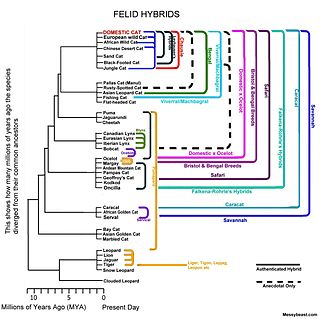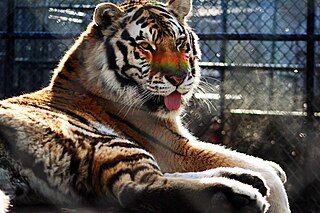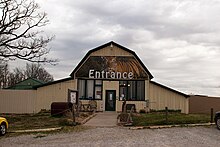The term "big cat" is typically used to refer to any of the five living members of the genus Panthera, namely the tiger, lion, jaguar, leopard, and snow leopard, as well as the non-pantherine cheetah and cougar.

Big Lake National Wildlife Refuge is an 11,047-acre (45 km²) National Wildlife Refuge located in Mississippi County, Arkansas, managed by the United States Fish and Wildlife Service. It is situated 2 miles (3.2 km) east of Manila, Arkansas, and consists mostly of a shallow lake, swamp, and bottomland hardwood forests. The preservation of habitat for waterfowl in an intensely agricultural region is the primary purpose of the refuge. 6,400 acres (20 km²) of Big Lake is classified as a National Natural Landmark and 2,144 acres (8 km²) are classified as wilderness.

A felid hybrid is any of a number of hybrids between various species of the cat family, Felidae. This article deals with hybrids between the species of the subfamily Felinae.
The Wildlife WayStation was a 160-acre animal sanctuary (65 ha) in Sylmar, California in northern Los Angeles County dedicated to rescuing and rehabilitating wild and exotic animals. A charitable corporation located within the boundaries of Angeles National Forest, the facility was founded in 1976 by animal activist Martine Colette, who resigned in May 2019 as president and chief operating officer.

Kalesar National Park and adjacent Kalesar Wildlife Sanctuary (13,209 acres are protected areas in Yamunanagar district of Haryana state in India, 122 kilometres from Chandigarh. Kalesar National Park was established in 2003. Kalesar National Park and Kalesar Wildlife Sanctuary are contiguous to Simbalbara National Park in Himachal Pradesh and Rajaji National Park in Uttarakhand. Kalesar is a popular destination for leopards, panthers, elephants, red jungle fowl and bird-watching. This forested area in the Shivalik foothills is covered primarily with sal with smattering of Semul, Amaltas and Bahera trees as well. Wildlife jeep safaris are available on 3 tracks. Park is closed July to September and during the remaining months visiting hours are 6 am to 10 am and 4 pm to 7 pm during summers, and 7 am to 11 am and 3.30 pm to 6 pm during winters.
Killman Zoo is a privately owned zoo approximately 4 kilometres or 2.5 miles north of Caledonia in Haldimand County, Ontario, Canada.

Wildlife rehabilitation is the treatment and care of injured, orphaned, or sick wild animals so that they can be released back to the wild.

Popcorn Park Animal Refuge is a small non-profit 7-acre (2.8 ha) animal refuge and sanctuary located in Forked River, New Jersey, within Lacey Township. According to the Associated Humane Societies, the refuge is "a sanctuary for abandoned, injured, ill, exploited, abused or elderly wildlife, exotic and farm animals, and birds." The refuge has programs to educate visitors about animals and their environments and offers hundreds of rescued dogs and cats for adoption, in their separate adoption building. The name "Popcorn Park" was adopted due to the small fee visitors pay to the entrance which grants them entry. No feeding of the animals is allowed since 2022.
The Performing Animal Welfare Society (PAWS) is a U.S.-based group for abandoned or abused performing animals as well as victims of the exotic animal trade. They claim 30,000 members. As a member accredited by The Association of Sanctuaries (TAOS), the society follows guidelines stipulated by TAOS, one of which is that none of the elephants be bred.

Carolina Tiger Rescue is a nonprofit wildcat sanctuary in Pittsboro, North Carolina, that offers public tours and field trips and is home to rescued tigers, lions, cougars, leopards, caracals, servals, bobcats and other wild animals. Over 20,000 visitors come to the sanctuary each year for guided tours, field trips, summer camps, volunteering and corporate work groups. Their mission is saving and protecting wild cats in captivity and in the wild. They work toward a day when wild cats are living in their native habitat and are not exploited by humans. Carolina Tiger Rescue is Global Federation of Animal Sanctuaries (GFAS) and USDA accredited. The Executive Director is Kris Marino.

Austin Zoo is a non-profit rescue zoo and located in southwestern unincorporated Travis County, Texas, United States, west of Austin. The zoo is accredited by the Zoological Association of America.

Cat Tales Wildlife Center formerly Cat Tales Zoological Park is a USDA Licensed - Class C - Exhibitor that helps rescue and protect big cats and Northwest wildlife. It is located in Mead, Washington. As the need for forever homes constantly changes 2020 increased the sanctuary count to twenty one various felines, including bobcat, lynx, puma, lion, Siberian tiger, Bengal tiger, and white tiger. Along with two black bears, and twelve various canines, including arctic fox, red fox, coyote, and wolfdog.

Panthera Corporation, or Panthera, is a charitable organization devoted to preserving wild cats and their ecosystems around the globe. Founded in 2006, Panthera is devoted to the conservation of the world’s 40 species of wild cats and the vast ecosystems they inhabit. Their team of biologists, data scientists, law enforcement experts and wild cat advocates studies and protects the seven species of big cats: cheetahs, jaguars, leopards, lions, pumas, snow leopards and tigers. Panthera also creates targeted conservation strategies for the world’s most threatened and overlooked small cats, such as fishing cats, ocelots and Andean cats. The organization has offices in New York City and Europe, as well as offices in Mesoamerica, South America, Africa and Asia.

The Wild Animal Sanctuary is a 1,214-acre (491 ha) animal sanctuary in Keenesburg, Colorado, United States. The sanctuary specializes in rescuing and caring for large predators which are being ill-treated, for which their owners can no longer care, or which might otherwise be euthanized. It is a 501(c)(3) nonprofit organization and a state and federally licensed zoological facility.
Tiger Haven is a non-profit 501(c)3 sanctuary for big cats in Roane County, Tennessee. The sanctuary has been in operation since September 1991.

Big Cat Rescue Corp., also known as BCR and previously known as Wildlife on Easy Street, Inc., operates an animal sanctuary in Hillsborough County, Florida, United States, which rescues and houses exotic cats, and rehabilitates injured or orphaned native wild cats. It was founded by Don Lewis and Carole Baskin in 1995.

Hope for Wildlife (HFW) is a non-profit wildlife rehabilitation and education centre located on a farm in Seaforth, Halifax Nova Scotia, Canada. It was founded by Hope Swinimer in 1997 as The Eastern Shore Wildlife Rehabilitation and Rescue Centre. It got its current name in 2005. A television series, Hope for Wildlife, began documenting the centre's efforts in 2009.












